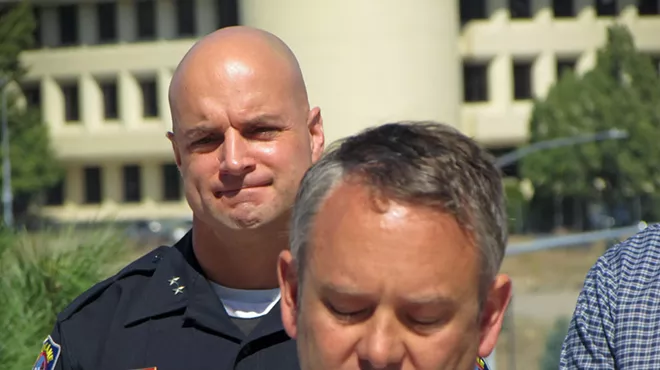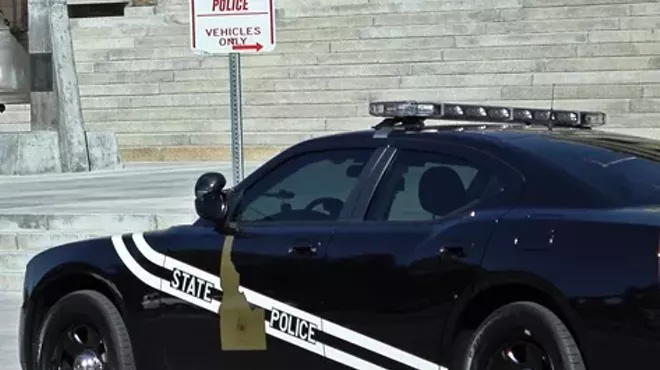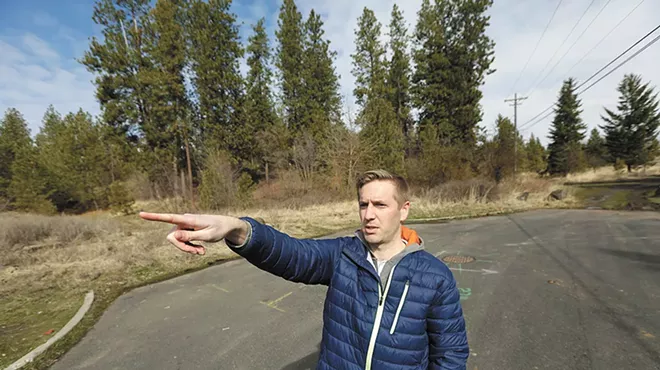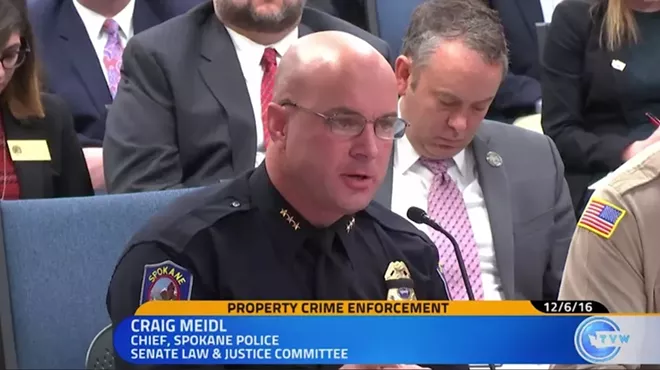There's nothing you want to see less after stumbling out from a four hour Spokane City Council meeting to see that your fancy new bicycle has been stripped of wheels. My bike had been locked up with a heavy-duty cable lock at a bike rack directly across the street from City Hall, at the south entrance of River Park Square, perhaps the most heavily trafficked retail environment in the city's urban core.
They tried to steal the whole thing. They tried to saw at my lock with a bolt cutter, and when that failed they tried to tear it apart. Both attempts failed. And yet, unable to deprive my bike of its life, thieves deprived it of its limb. The rack on the back had also been snatched, a task that requires a lengthy unbolting process to free it from the body.
And my bike wasn't the only victim. Several others nearby appeared to have had their seats and wheels stripped.
So who do I blame?
I could blame, obviously, the bike thieves.
Apparently, they didn't just steal my wheels, they made off with other parts and other bikes. At the same time.
The surveillance footage, a security officer from River Park Square says, shows two males, both white. One has a shaved, stubbled head and both have dark hair. Both are thin, with a medium build. One is about 5-foot-10 and the other is 5-foot-9. Both are wearing dark clothing. One has red shoes.
That description, riveting as it is, doesn't help, of course. Pictures help. Video footage helps. And while camera footage elsewhere in the mall appears to show exactly who stole my bike — allowing the people of Spokane to theoretically identify exactly who the crooks were, just like last time — but River Park Square doesn't want to hand it over. They don't want me going all John Wick on the thieves. They'll give it to the cops, and the cops are willing to give me the footage after a lengthy public records process, but only if it's attached to the police report. The footage doesn't get attached to the police report.
So I could blame River Park Square.
Not just for refusing to hand over the footage. But for putting a "you-can't-blame-us-if-your-bike-gets-stolen" sign above the rack instead of a quality surveillance camera. For cramming the bike rack under the parking garage ramp, off to the side, in the shadows, easier to steal.
I could blame all the passersby who, upon seeing a dynamic duo stripping bikes of their parts, bolt-cutting cable locks, unscrewing bike racks, presumably didn't stop to ask if anything was suspicious.
I could blame my bike.
My bike looks sexier than it actually is. I get catcalls. "Nice bike!" people say, leering at the frame. No one bothered trying to steal my old beat-up used Diamondback with ramshackle pedals. But the Giant? Sometimes I worry it looks like the bike-theft equivalent of a Faberge egg, able to bring grizzled crime veterans out of retirement for one last heist.
I could blame myself.
I know better. I know that my bike has a quick-release wheel on the front. I know that every time I lock up my bike, I'm supposed to loop the cable lock through the front and back wheels and the frame before, ideally, securing the entire thing to the rack with a heavy-duty U-lock.
"A lot of it has to do with inconvenience," says Mic Woodruff, manager of Bike Hub, the downtown shop that sold me my bike. "Not a lot of people want to carry around a heavy lock.
So maybe bike shop employees are to blame, Woodruff suggests.
"It falls on the bike shop employee once in a while," he says. "We should do more explaining to people."
He says a lot of thieves steal parts in order to mix and match bikes, making them harder to trace. If you find a screaming deal on Craigslist and then the bike doesn't look quite right, that's why. So it's crucial, he says, to not just secure the bike, but secure the part.
"You don't want to come back like you did and just find a carcass with no wheels," he says.
I know that, of course. But it's the little things, the little inconveniences that add up, over time. It would take five seconds to lock it up properly. But most of the time I don't have five seconds. I'm just too important for property security.
I could blame the cops.
It's not like the cops don't care about bike theft. Heck, the cops just recently used a sting operation to catch bike thieves — and charged them with felonies.
Yes, year to date, property crime and larceny is actually down a small amount this year from the year before. But in the downtown precinct, it's slightly up this year. Follow any Facebook group that talks about property crime, and you'll see roiling frustration over police officers being slow to investigate much of the property crime dogging the city.
It's a matter of priorities. Even the theft of a $1,200 painting back in 2016 didn't initially rise high enough on the threshold to get investigated. Bike wheels? Forget about it.
There are only so many officers, of course, and there are crimes like domestic violence, assaults
“Honestly, if you want to get right down to the crux of the problem, it comes down to the drug problem in the city," Spokane Police Officer Theresa Fuller says. "That’s why they commit those crimes. If there were additional resources to deal with the drug problems, that might address the issue."
I could blame drug addiction.
That was the view of Stevie Sivertsen, a former thief who says he stole hundreds and hundreds of bikes in the Spokane are when he talked to us a few years ago.
"Any bike above a couple of grand is worth $150 in dope," Sivertsen says. Sometimes they aren't even resold, they're just sold for scrap metal. How sad is that?
But with his meth addiction, Sivertsen says, morality wasn't at play. He'd steal diabetes equipment and oxygen tanks. He didn't care who it hurt.
"There are no sober people committing the crimes you’re talking about," Sivertsen said. "If you can address the drug problem you will have addressed the property problem."
But addressing drug addiction is one of those impossible hurdles. Opioids are particularly difficult to wean yourself off of. Dr. Matt Layton, former medical director of the opioid treatment program at the Spokane Regional Health District, told the Inlander last year that without medication 90 percent of addicts who go to rehab relapse.
Addressing opioid addiction longterm is a lot more feasible when replacement drugs like methadone or Suboxone, but those have their own stigmas, costs and strict schedules that are incredibly challenging to adhere to. And that's if they choose to try to get help to begin with — or even have the option.
"We need a seamless continuum of services," Layton says.
I could blame Spokane County Prosecutor Larry Haskell.
It's not that Haskell goes easy on property criminals. In fact, it's the opposite. Haskell is so tough on repeat offenders that mandating drug treatment often isn't even an option for them. On the one hand, Haskell has closed loopholes that effectively allowed arrested criminals to commit more crimes before their sentencing without it impacting their punishments.
On the other, critics say he's shut the door on the exact population who could benefit most from serious drug treatment alternatives. Instead, they get put in jail for a stint, and then get out and commit more crimes.
Except some don't go to jail at all.
I could blame the crowded jail.
Talk to Sheriff Ozzie Knezovich about property crime and he'll bring up this issue pretty darn quickly. The Spokane County Jail is overcrowded. When the jail is overcrowded, minor criminals don't get sent to jail for more than few days.
"It takes roughly 10 times being arrested in a stolen car before you get any significant repercussions," Knezovich says. "We raised an entire generation of criminals that know one thing: There’s no accountability for committing crimes."
Knezovich says he's all for "smart justice," the judicial approach that focuses more on rehabilitation than incarceration. But even with that approach, he says, you need a stick to go along with the carrot. Without jail cells available, Knezovich says, that stick is practically non-existent. He wants a bigger jail — and is critical of all those people who haven't been willing to pursue it.
"Local elected officials are afraid to push the button because they're afraid of the word 'tax,'" Knezovich says. "It's going to take money to fix this system.
But plenty of other people don't see jail as the answer.
"The idea that you could somehow jail your way out of it is not workable at all," Spokane City Councilman Breean Beggs says. "$135 bucks a day is way more expensive than supervision and treatment."
The problem? In Washington, supervision of property crime criminals is almost non-existent.
I could blame the state legislators who systematically chipped away at supervision for property criminals — and the leaders who have failed to fix it ever since.
The state of Washington used to have 65,000 criminals under state supervision. But in 2003, that number was cut to 30,000, eliminating supervision for nearly all property crime offenders. The culprit was Washington state Senate Bill 5990, which largely eliminated post-release supervision. (Both voting in favor? State Sen. Lisa Brown and State Rep. Cathy McMorris Rodgers.)
In 2009, it got even worse, as the Legislature slashed another 14,500 from the roles of supervision.
That means that when a property crime offender gets out of prison in Washington, generally nobody is looking after them. Nobody is making sure that they don't go back to a life of crime. And yet, property crime offenders are among the types of criminals most likely to re-offend.
So, this was the state of affairs as the Inlander reported in 2016:
Washington is the only state in the nation that doesn't supervise property crime offenders after they're released from prison, other than the occasional specialized sentencing alternative.Everyone knows that's the problem. Gov. Jay Inslee's task force identified this problem way back in 2015. We're out of the recession. Our economy, as Inslee is happy to proclaim, is doing marvelously.
So why haven't we fixed the supervision problem? Over the years, there have been plenty of challenges, says Rep. Timm Ormsby, budget chair for the Washington state House. The state's McCleary lawsuit mandated massive spending on education, leaving little extra slack for public safety. Even a proposal for a state-funded pilot to allowing a year of supervision to tacked onto sentences for Spokane car thieves ran into problems last year, despite passing out of the Senate overwhelmingly.
Public defenders had objected to constitutional equal-protection problems with effectively giving steeper sentences to offenders in some parts of the state. But if you applied it to the entire state? Then you run into budgetary issues.
One possible solution? Allow supervision to be given instead of jail time, actually saving the state money in the long run and freeing up jail beds. But that, traditionally, has run into skepticism from law enforcement groups.
Either way, Ormbsy says, the Legislature hasn't given up on the idea. Expect the property crime issue to be raised yet again during next year's legislative session.
"My challenge to them has been you need to get this buttoned up, so we don’t have to adjudicate this in real time," Ormsby says.
I could blame the human condition, mankind's sinful nature or the sovereignty of God.
I pose the theological question to my pastor: Why do bad things happen to good bicycles?
"Should have come to church on Sunday,"


































